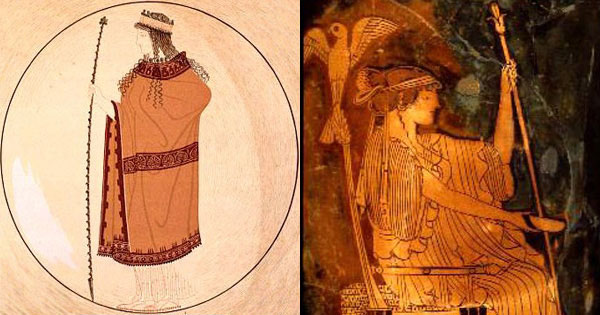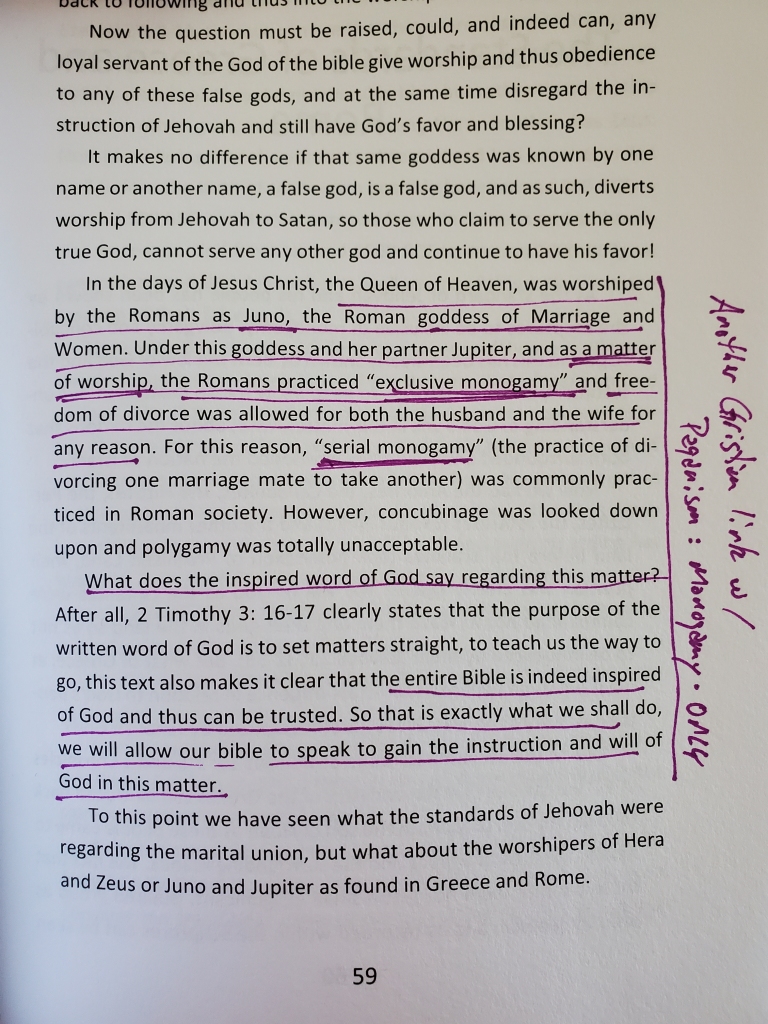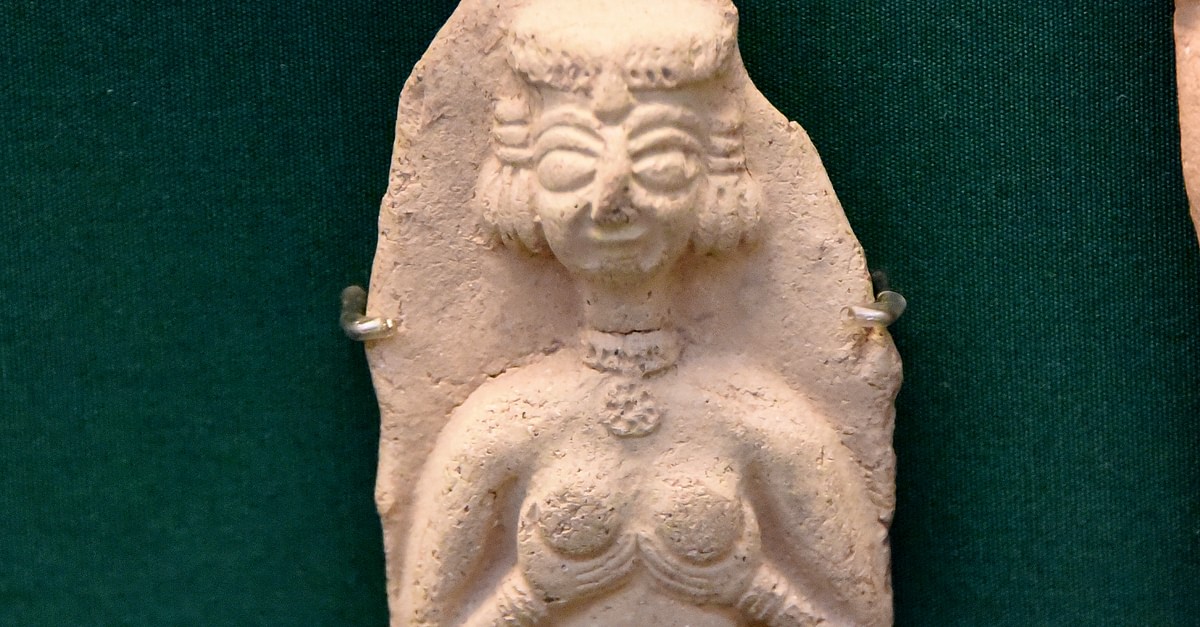Why were the Greeks monogamous? Where did monogamy come from? And why?
This post got me thinking and looking and I realized something. Everyone points to the Greeks as the originators of monogamy, at least in Western Civilization. But no one says why or how. Most articles simply make the assertion but make zero attempt at any legitimate analysis.
The assertion here about Goddesses I think is very insightful. The primary Greek Goddess is Hera, the Goddess of marriage, Queen of Heaven and consort to Zues. And she is famously a vengeful, spiteful, jealous goddess always going after Zeus's mistresses and their offspring. As such, she embodies the spirit of monogamy: jealousy. control. spite. The very opposite of a loving help-meet who wants the best for her man.

"HERA (Hêra or Hêrê), probably identical with kera, mistress, just as her husband, Zeus, was called erros in the Aeolian dialect"

 www.psychologytoday.com
www.psychologytoday.com
You can read the whole thing there, their description in some sounds like a co-dependent wife; the very sort that would violently act like Hera did in the myths and like so many wives do when their husbands suggest polygamy.
So what's the point of this little detour into Greek Mythology? Marriage is a cultural institution. Culture itself is formed from a feedback loop of religion, genetics, economy, language and more. Myths are very powerful in shaping people and culture. Your can see the essential characteristics of monogamy in Greek mythology, it's not hard to see how that influenced the culture on marriage. It is useful to note that the Greeks had concubines in the form of war captive slave women. They were monogamous in marriage but not sex. You see this in Zeus's dalliances or in the probably more common were man-boy relationships which probably were not as threatening to a wife's status. It begs the question if the rise of homosexuality is a necessary or common end result of monogamy. They certainly come from the same fount.
But this is all complex with varying influences and feedback loops. You can see in Christian polygamy how GrecoRoman culture trumped religion, transformed the religion, and then the power of that religion used colonial style to shape the marriage cultures of the other peoples of Europe. The real question is, what was the prime mover? What kicked of monogamy? These myths and the cultural practice had to start somewhere.
I would suggest maybe it came from Hera directly.
She was one of their earliest gods, a founding influence if you will. But they didn't just worship her, the temples had oracles, human vessels for the gods to speak directly to man. From a Biblical worldview these were in all likelihood originally demon possessed individuals. Paul in 1 Timothy 4 verifies this conjecture when he points out that prohibiting marriage is a doctrine of demons...
Hera was the Queen of Heaven. This is a title common across many ancient religions (and modern Catholicism, whose Mariolatry has a decidedly feminist slant). We should remember that many of the ancient deities shared common stories, titles, characteristics but went under different names. This is likely because they all date back to the same source, whether at Babel or before the flood in the Watchers; having her source in some early queen (whether human, nephalim or angelic). And so the origins are obscured despite the common threads.
And because of that I would not at all be surprised to find that Ishtar or Astarte or any other ancient 'goddess' was also pushing monogamy in some form.
This post got me thinking and looking and I realized something. Everyone points to the Greeks as the originators of monogamy, at least in Western Civilization. But no one says why or how. Most articles simply make the assertion but make zero attempt at any legitimate analysis.
The assertion here about Goddesses I think is very insightful. The primary Greek Goddess is Hera, the Goddess of marriage, Queen of Heaven and consort to Zues. And she is famously a vengeful, spiteful, jealous goddess always going after Zeus's mistresses and their offspring. As such, she embodies the spirit of monogamy: jealousy. control. spite. The very opposite of a loving help-meet who wants the best for her man.

HERA - Greek Goddess of Marriage, Queen of the Gods
Hera was the ancient Greek Queen of the Gods, and the goddess of marriage, women, the sky and the starry heavens. She was usually depicted as a beautiful woman wearing a crown and holding a royal, lotus-tipped sceptre. Her Roman name was Juno.
www.theoi.com
"HERA (Hêra or Hêrê), probably identical with kera, mistress, just as her husband, Zeus, was called erros in the Aeolian dialect"
"she was treated by the Olympian gods with the same reverence as her husband...Zeus himself, according to Homer, listened to her counsels, and communicated his secrets to her rather than to other gods. Hera also thinks herself justified in censuring Zeus when he consults others without her knowing it...
Her character, as described by Homer, is not of a very amiable kind, and its main features are jealousy, obstinacy, and a quarrelling disposition, which sometimes makes her own husband tremble. Hence there arise frequent disputes between Hera and Zeus; and on one occasion Hera, in conjunction with Poseidon and Athena, contemplated putting Zeus into chains.... and when she is unable to gain her ends in any other way, she has recourse to cunning and intrigues...
she is the goddess of marriage and of the birth of children...
Hera had sanctuaries, and was worshipped in many parts of Greece, often in common with Zeus. Her worship there may be traced to the very earliest times.
Respecting the real significance of Hera, the ancients themselves offer several interpretations: some regarded her as the personification of the atmosphere , others as the queen of heaven or the goddess of the stars, or as the goddess of the moon, and she is even confounded with Ceres, Diana, and Proserpina. According to modern views, Hera is the great goddess of nature, who was every where worshipped from the earliest times. The Romans identified their goddess Juno with the Greek Hera."

Hera, the Greek Goddess of Marriage
Hera is the goddess of marriage. Her name means great lady, the feminine form of the Greek word hero. She represented the ideal woman...
"Hera is the goddess of marriage. Her name means great lady, the feminine form of the Greek word hero. She represented the ideal woman...
She clearly had a shadow side, and her weak suit was her jealous and vengeful nature, principally aimed against the lovers of her husband and their illegitimate offspring."
You can read the whole thing there, their description in some sounds like a co-dependent wife; the very sort that would violently act like Hera did in the myths and like so many wives do when their husbands suggest polygamy.
So what's the point of this little detour into Greek Mythology? Marriage is a cultural institution. Culture itself is formed from a feedback loop of religion, genetics, economy, language and more. Myths are very powerful in shaping people and culture. Your can see the essential characteristics of monogamy in Greek mythology, it's not hard to see how that influenced the culture on marriage. It is useful to note that the Greeks had concubines in the form of war captive slave women. They were monogamous in marriage but not sex. You see this in Zeus's dalliances or in the probably more common were man-boy relationships which probably were not as threatening to a wife's status. It begs the question if the rise of homosexuality is a necessary or common end result of monogamy. They certainly come from the same fount.
But this is all complex with varying influences and feedback loops. You can see in Christian polygamy how GrecoRoman culture trumped religion, transformed the religion, and then the power of that religion used colonial style to shape the marriage cultures of the other peoples of Europe. The real question is, what was the prime mover? What kicked of monogamy? These myths and the cultural practice had to start somewhere.
I would suggest maybe it came from Hera directly.
She was one of their earliest gods, a founding influence if you will. But they didn't just worship her, the temples had oracles, human vessels for the gods to speak directly to man. From a Biblical worldview these were in all likelihood originally demon possessed individuals. Paul in 1 Timothy 4 verifies this conjecture when he points out that prohibiting marriage is a doctrine of demons...
"But the Spirit saith expressly, that in later times some shall fall away from the faith, giving heed to seducing spirits and doctrines of demons,through the hypocrisy of men that speak lies, branded in their own conscience as with a hot iron; forbidding to marry, and commanding to abstain from meats, which God created to be received with thanksgiving by them that believe and know the truth."
Hera was the Queen of Heaven. This is a title common across many ancient religions (and modern Catholicism, whose Mariolatry has a decidedly feminist slant). We should remember that many of the ancient deities shared common stories, titles, characteristics but went under different names. This is likely because they all date back to the same source, whether at Babel or before the flood in the Watchers; having her source in some early queen (whether human, nephalim or angelic). And so the origins are obscured despite the common threads.
And because of that I would not at all be surprised to find that Ishtar or Astarte or any other ancient 'goddess' was also pushing monogamy in some form.



